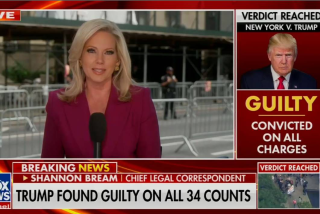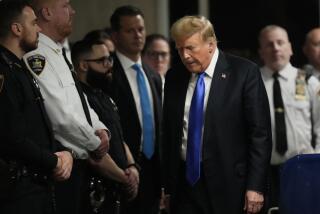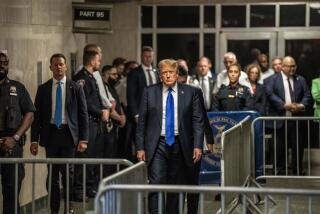Bipartisan Spirit Soars After Votes
- Share via
WASHINGTON — Some stood at attention, like military men, and called their votes out loud and clear. Others rose to their feet with what looked like reluctance and delivered their verdicts--”guilty” or “not guilty”--in hoarse, almost pleading tones.
It took a little more than eight minutes both times, all 100 senators rising in practiced alphabetical order.
But once the two solemn roll calls were over and the chief justice declared the result--”William Jefferson Clinton, president of the United States . . . hereby is acquitted of the charges in the said articles”--the Senate dissolved into bipartisan relief like a high school class at graduation.
Party leaders Trent Lott (R-Miss.) and Tom Daschle (D-S.D.) got a standing ovation and clasped each others’ hands in mutual congratulation. “We did it!” Daschle said with a grin. “We sure did,” Lott said, grinning back.
U.S. Chief Justice William H. Rehnquist got a plaque, like a Rotary Club honoree, and gamely hoisted it for the cameras. And after 13 months of scandal, five weeks of trial proceedings and three days of closed-door deliberations, both Democrats and Republicans declared that they were better for the experience.
“It was emotional,” said Sen. Dianne Feinstein (D-Calif.). “In a way, it was profound.”
“It’s like boot camp,” said Sen. Larry E. Craig (R-Idaho), one of the Senate’s most conservative members. “It brought us closer in a way that I doubt would have otherwise happened.”
Even Republicans who had sought to convict Clinton--and for whom the president’s acquittal might thus seem something of a failure--pronounced the trial a splendid success.
“There was a tremendous feeling of bipartisan cooperation and good will,” said Sen. Rick Santorum (R-Pa.). “We showed that just because you disagree, you don’t have to be disagreeable.”
Old arguments--in some cases, only hours old--were determinedly forgotten. Sen. Patrick J. Leahy (D-Vt.), one of Clinton’s most fervent defenders, gave House Judiciary Chairman Henry J. Hyde (R-Ill.) a high-five. Rep. Asa Hutchinson (R-Ark.), one of the president’s most relentless accusers, crossed the well to pump the hand of every White House lawyer. Rep. Maxine Waters (D-Los Angeles), who came to show support for Clinton, roamed the Senate floor collecting autographs on her tally sheet, a souvenir of the vote.
Parties Agree to Move On
And everyone, Democrat and Republican alike, agreed that it was time to move on--literally. An hour after the last vote was cast, the Capitol was virtually empty. Most senators were on their way out of town, and the impeachment of Clinton was a waning memory.
“Why in the world would we want to keep the issue of President Clinton and Monica Lewinsky before us?” asked Sen. Wayne Allard (R-Colo.), who until Friday was a dogged proponent of the president’s impeachment.
The final day of the Senate trial began at 6:30 a.m. PST Friday, with a last, two-hour session behind closed doors for a handful of senators who had not spoken in the chamber’s deliberations.
One was Robert C. Byrd (D-W.Va.), the self-appointed guardian of Senate rules and constitutional order, whose votes were still in doubt. Byrd said that he felt Clinton had “abused the powers vested in him by the people” and that the president’s offenses did add up to “high crimes and misdemeanors.”
“This is, without question, the most difficult, wrenching, soul-searching vote that I have ever cast,” Byrd said.
Then, just as he was about to announce his decision, Byrd ran out of time, other senators said. Rehnquist gaveled his speech to an end.
“We didn’t know what he was going to do,” said Sen. John B. Breaux (D-La.). “Everybody was holding their breath.”
When the roll call came on Article I, which accused Clinton of perjury, Byrd stood stiffly even before his name was called. When his turn came, he looked down for a moment, then said quietly: “Not guilty.”
Two-Thirds Vote Remained Elusive
When Sen. John W. Warner (R-Va.) voted “not guilty,” there were gasps in the packed galleries, but not on the floor. Warner had told his GOP colleagues that he would vote to acquit on Article I.
Article I failed by 22 votes, 45 to 55.
Article II, which accused Clinton of obstruction of justice, was closer. Five Republicans joined all 45 Democrats in voting “not guilty.” But neither vote even approached the two-thirds majority needed to throw Clinton out of the White House.
Sen. John H. Chafee (R-R.I.) pronounced the verdict crisply; Sen. Susan Collins (R-Maine) almost inaudibly; Sen. James M. Jeffords (R-Vt.) slowly and solemnly; Sen. Olympia J. Snowe (R-Maine) in a firm New England twang. The last Republican to vote for acquittal, Sen. Arlen Specter (R-Pa.), gave the verdict a personal twist: “Not proven, therefore not guilty.”
After the vote and the back-slapping congratulations, the Senate returned abruptly to its normal muddle. Feinstein sought a vote on her proposal to censure Clinton. Sen. Phil Gramm (R-Texas) objected and the Senate voted to keep it off the floor. Other senators, including many Democrats, said that they had no desire to restart the debate over Clinton’s sins.
Instead, they had other business to do. Allard headed for Colorado and a series of town meetings on Social Security. Sen. Carl Levin (D-Mich.) headed for a television interview, then a flight to Detroit. Sen. John McCain (R-Ariz.) dashed for the airport to fly to Miami, where he was due at a fund-raiser for his nascent 2000 presidential campaign.
On the Capitol’s east lawn, a tiny band of anti-Clinton protesters--numbering exactly 12 on Friday morning--waved signs from a distance, held back by a flimsy temporary fence.
Even they acknowledged that the country had moved on.
“It’s not Clinton. It’s not Congress. It’s the people of this nation who are dropping the ball,” said Paul Mitchell, a retired firefighter-turned-evangelist from Norco, Calif., who came to Washington for the trial.
Besides, noted demonstrator Kristinn Taylor, 36, of Washington, it’s hard to turn out protesters these days. “People have jobs,” he said. “We’re in a full-employment economy.”
*
Times staff writers Geraldine Baum, Marc Lacey, Edwin Chen and Alissa J. Rubin contributed to this story.
More to Read
Get the L.A. Times Politics newsletter
Deeply reported insights into legislation, politics and policy from Sacramento, Washington and beyond. In your inbox twice per week.
You may occasionally receive promotional content from the Los Angeles Times.










